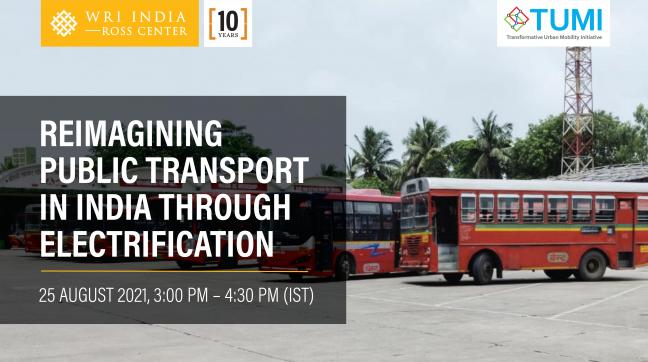Reimagining Public Transport in India Through Electrification

The latest Faster Adoption and Manufacturing of Hybrid and Electric vehicle (FAME) notification discusses aggregation of demand for electric buses in 9 cities of India. At a time when public bus agencies are struggling to identify resources for fleet augmentation, central and state subsidies have been helpful in driving electric bus adoption in the country. The subsidies for electric buses have been instrumental in not only scaling up clean public transport, but also add to the overall public transport supply in cities.
Watch the full event here
The conversation on electric buses has opened a whole new avenue for bus-based public transport in India. A transition to electric buses requires a complete reimagining of bus system as opposed to operations of Internal Combustion Engine (ICE) buses. Consideration of multiple factors such as battery sizing, siting of charging infrastructure, route planning, charging infrastructure scheduling, etc. is required for electric bus planning.
Cities like Santiago have proved that a scaled transition to electric buses is possible and provides benefits in the form of saving in operations and engine maintenance costs to the tune of 70% as compared to diesel buses. In India, electric buses can be utilized to enhance public transport planning with improved Standard Operating Procedures. Incorporation of electric buses within existing fleet requires extensive route planning, which can be coupled with demand forecasting and spatial planning to rationalize urban bus operations. Savings accrued from electric bus operations can be channeled to improved passenger services. Therefore, this transition can be used as an opportunity for a holistic upgrade of bus-based public transport in India.
Topics to be discussed
The panel discussion will bring together the key stakeholders (Public bus agencies, policymakers, fleet operators, vehicle manufacturers/ OEMs, banking institutions, researchers, and enthusiasts) driving electric bus transition in India to explore:
- What role will the new FAME notification play in scaling up electric bus deployment in India?
- How can electric bus operations be made cost-effective or achieve parity with existing ICE bus operations?
- How does transition to electric bus pave way for optimization of bus-based public transport in India?
- What are the opportunities that open-up with electric bus procurement to improve public transport services and passenger comfort?
- How can various stakeholders make sure that electric buses assume the role of gamechanger for public transport?
SPEAKERS
- Dr. OP Agarwal, CEO, WRI India (Opening remarks)
- Arun Goel IAS, Secretary, Department of Heavy Industries, Government of India (Keynote Address) (TBC)
- Sudhendu J Sinha, Adviser, Infrastructure Connectivity & Electric Mobility, NITI Aayog (Address)
- Rohan Modi, Advisor, TUMI EBus Mission, GIZ (Introduction to TUMI EBus Mission)
PANELLISTS
- Ashish Kundra IAS, Principal Secretary, Transport, Government of Delhi (TBC)
- Mukesh Kumar IAS, Municipal Commissioner, Ahmedabad Municipal Corporation
- Deepak Kumar SB IAS, Special Transport Commissioner, Government of Delhi
- Anbu Abraham IAS, MD, Metropolitan Transport Coorportaion, Chennai (TBC)
- Mahua Acharya, CEO, Convergence Energy at Energy Efficiency Services Limited (EESL)
- Randheer Singh, Director, Electric Mobility, NITI Aayog
- Dr. Jens Giersdorf, Advisor, TUMIVolt, GIZ
- Nishant Arya, Vice Chairman, JBM Group
- Vijay Medikonda, GM - Sales & Marketing, Olectra Geeentech
- Madhav Pai, Executive Director, WRI India Ross Centre (Moderator)

